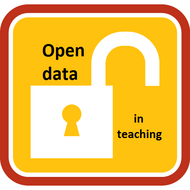Teaching with research data: report to the Australian National Data Service (ANDS)
(View Complete Item Description)Teaching with Research Data by the Australian National Data Service (ANDS) provides nine case studies of courses that incorporate data usage in teaching. These case studies cover various subject areas. Two examples activities are: History at the University of Melbourne: data creation and text analysis in the humanities The course includes an introduction to big data. The creation of vast textural databases means that it is possible not just to find information but to analyse and interpret in ways not previously available for teaching or for the general public. Students are encouraged to use databases of text such as Google Books (using NGram) or the NLA’s Trove newspapers (using QueryPic) to generate graphs of word use or phrase use frequency to see whether their findings accord with other evidence or to otherwise add depth to their assignments. Students are required to open a Zotero account, and use it to collect and present information they have collected. Use of Omeka is currently under investigation: this is an open source web publishing platform to display online exhibitions of scholarly materials and has been one of those resources publicised by the University of Melbourne Research Bazaar. Approaches to Research in Education at Flinders University: learning social science methodology using real data David Curtis is Associate Professor, Educational Research at Flinders University where he also teaches a number of subjects to do with statistical methods and research techniques as part of masters degree courses in education. One subject in particular, Approaches to Research (EDUC9761) has a focus on using authentic data, most often PISA data from the OECD19 and LSAY data collected by ACER20. The primary object of the course is to introduce both qualitative and quantitative approaches to research, including the identification of problems, literature review, developing questions and hypotheses, collecting and analysing data and reporting and evaluating research. In this context, use of authentic data provides an opportunity to explore real issues within the field and to integrate the students’ studies with their own research interest. Using real world data means that students confront issues such as incompleteness, measures which are ‘not quite as good as you might wish they were’ and other problems usually not encountered with manufactured data sets.
Material Type: Lesson











